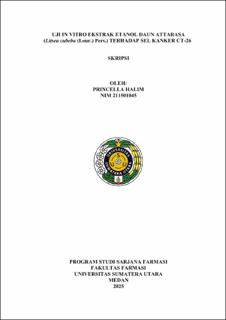Uji In Vitro Ekstrak Etanol Daun Attarasa (Litsea cubeba (Lour.) Pers.) Terhadap Sel Kanker CT-26
In Vitro Test of Ethanol Extract of Attarasa Leaves (Litsea cubeba (Lour.) Pers.) On CT-26 Cell Line

Date
2025Author
Halim, Princella
Advisor(s)
Syahputra, Rony Abdi
Kim, Bonglee
Metadata
Show full item recordAbstract
Background: Colorectal cancer, a prevalent global malignancy, faces treatment challenges due to drug resistance and toxicity. Litsea cubeba, a plant with bioactive compounds, exhibits antibacterial, anti-inflammatory, and antioxidant properties. Emerging evidence suggests its anticancer potential via modulation of the PI3K/AKT pathway, a key driver of cancer progression.
Aim: This study evaluates Litsea cubeba leaves ethanol extract’s phytochemical composition, characterization, and anticancer effects on colorectal cancer, focusing on PI3K/AKT pathway modulation.
Methods: Litsea cubeba leaves from Sidikalang, Indonesia, were authenticated and analyzed macroscopically (leaf morphology, aroma) and microscopically (stomata, vascular bundles). Physicochemical and phytochemical screenings identified bioactive compounds. Ethanolic extract was prepared via maceration and tested for cytotoxicity against CT-26 cells. PI3K/AKT protein expression was assessed via Western Blot.
Results: The extract contained alkaloids, flavonoids, saponins, and tannins. Physicochemical parameters met quality standards. Cytotoxicity assays showed dose-dependent cell death (IC50: 44.52 µg/mL). Western Blot confirmed reduced PI3K/AKT protein levels, indicating pathway suppression. Microscopic analysis revealed anomocytic stomata, oil cells, and vascular structures.
Conclusion: Litsea cubeba leaf extract demonstrates moderate cytotoxicity and PI3K/AKT pathway inhibition in colorectal cancer cells, supporting its potential as a natural therapeutic. Further research is needed to validate efficacy and safety for clinical translation.
Collections
- Undergraduate Theses [1818]
